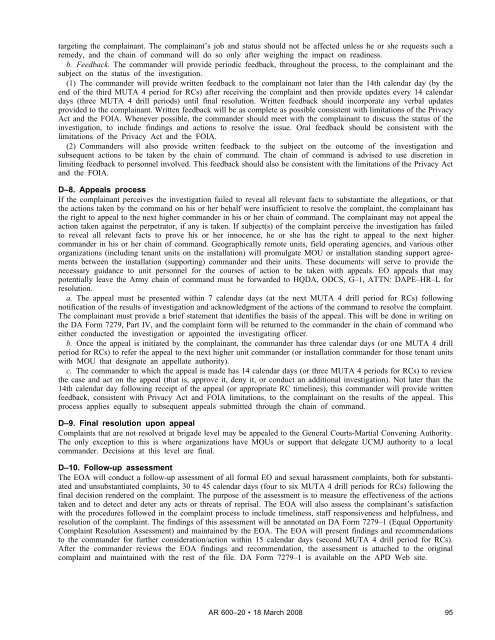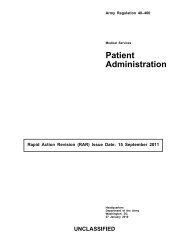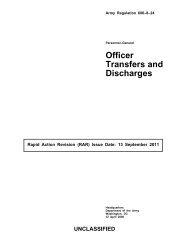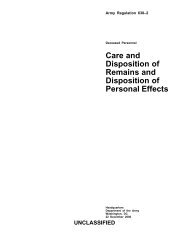AR 600-20, Army Command Policy - Army Publishing Directorate ...
AR 600-20, Army Command Policy - Army Publishing Directorate ...
AR 600-20, Army Command Policy - Army Publishing Directorate ...
You also want an ePaper? Increase the reach of your titles
YUMPU automatically turns print PDFs into web optimized ePapers that Google loves.
targeting the complainant. The complainant’s job and status should not be affected unless he or she requests such a<br />
remedy, and the chain of command will do so only after weighing the impact on readiness.<br />
b. Feedback. The commander will provide periodic feedback, throughout the process, to the complainant and the<br />
subject on the status of the investigation.<br />
(1) The commander will provide written feedback to the complainant not later than the 14th calendar day (by the<br />
end of the third MUTA 4 period for RCs) after receiving the complaint and then provide updates every 14 calendar<br />
days (three MUTA 4 drill periods) until final resolution. Written feedback should incorporate any verbal updates<br />
provided to the complainant. Written feedback will be as complete as possible consistent with limitations of the Privacy<br />
Act and the FOIA. Whenever possible, the commander should meet with the complainant to discuss the status of the<br />
investigation, to include findings and actions to resolve the issue. Oral feedback should be consistent with the<br />
limitations of the Privacy Act and the FOIA.<br />
(2) <strong>Command</strong>ers will also provide written feedback to the subject on the outcome of the investigation and<br />
subsequent actions to be taken by the chain of command. The chain of command is advised to use discretion in<br />
limiting feedback to personnel involved. This feedback should also be consistent with the limitations of the Privacy Act<br />
and the FOIA.<br />
D–8. Appeals process<br />
If the complainant perceives the investigation failed to reveal all relevant facts to substantiate the allegations, or that<br />
the actions taken by the command on his or her behalf were insufficient to resolve the complaint, the complainant has<br />
the right to appeal to the next higher commander in his or her chain of command. The complainant may not appeal the<br />
action taken against the perpetrator, if any is taken. If subject(s) of the complaint perceive the investigation has failed<br />
to reveal all relevant facts to prove his or her innocence, he or she has the right to appeal to the next higher<br />
commander in his or her chain of command. Geographically remote units, field operating agencies, and various other<br />
organizations (including tenant units on the installation) will promulgate MOU or installation standing support agreements<br />
between the installation (supporting) commander and their units. These documents will serve to provide the<br />
necessary guidance to unit personnel for the courses of action to be taken with appeals. EO appeals that may<br />
potentially leave the <strong>Army</strong> chain of command must be forwarded to HQDA, ODCS, G–1, ATTN: DAPE–HR–L for<br />
resolution.<br />
a. The appeal must be presented within 7 calendar days (at the next MUTA 4 drill period for RCs) following<br />
notification of the results of investigation and acknowledgment of the actions of the command to resolve the complaint.<br />
The complainant must provide a brief statement that identifies the basis of the appeal. This will be done in writing on<br />
the DA Form 7279, Part IV, and the complaint form will be returned to the commander in the chain of command who<br />
either conducted the investigation or appointed the investigating officer.<br />
b. Once the appeal is initiated by the complainant, the commander has three calendar days (or one MUTA 4 drill<br />
period for RCs) to refer the appeal to the next higher unit commander (or installation commander for those tenant units<br />
with MOU that designate an appellate authority).<br />
c. The commander to which the appeal is made has 14 calendar days (or three MUTA 4 periods for RCs) to review<br />
the case and act on the appeal (that is, approve it, deny it, or conduct an additional investigation). Not later than the<br />
14th calendar day following receipt of the appeal (or appropriate RC timelines), this commander will provide written<br />
feedback, consistent with Privacy Act and FOIA limitations, to the complainant on the results of the appeal. This<br />
process applies equally to subsequent appeals submitted through the chain of command.<br />
D–9. Final resolution upon appeal<br />
Complaints that are not resolved at brigade level may be appealed to the General Courts-Martial Convening Authority.<br />
The only exception to this is where organizations have MOUs or support that delegate UCMJ authority to a local<br />
commander. Decisions at this level are final.<br />
D–10. Follow-up assessment<br />
The EOA will conduct a follow-up assessment of all formal EO and sexual harassment complaints, both for substantiated<br />
and unsubstantiated complaints, 30 to 45 calendar days (four to six MUTA 4 drill periods for RCs) following the<br />
final decision rendered on the complaint. The purpose of the assessment is to measure the effectiveness of the actions<br />
taken and to detect and deter any acts or threats of reprisal. The EOA will also assess the complainant’s satisfaction<br />
with the procedures followed in the complaint process to include timeliness, staff responsiveness and helpfulness, and<br />
resolution of the complaint. The findings of this assessment will be annotated on DA Form 7279–1 (Equal Opportunity<br />
Complaint Resolution Assessment) and maintained by the EOA. The EOA will present findings and recommendations<br />
to the commander for further consideration/action within 15 calendar days (second MUTA 4 drill period for RCs).<br />
After the commander reviews the EOA findings and recommendation, the assessment is attached to the original<br />
complaint and maintained with the rest of the file. DA Form 7279–1 is available on the APD Web site.<br />
<strong>AR</strong> <strong>600</strong>–<strong>20</strong> 18 March <strong>20</strong>08<br />
95
















